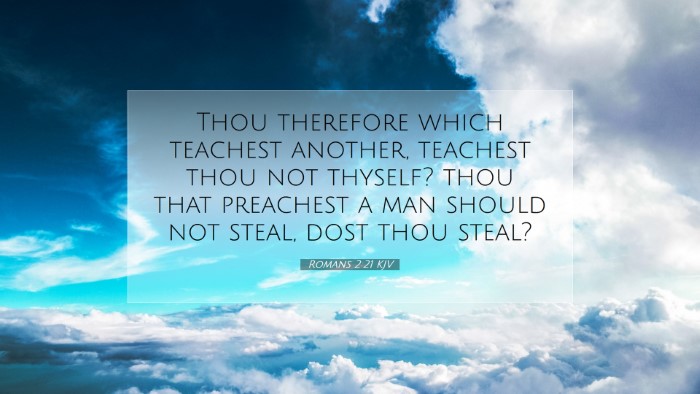Commentary on Romans 2:21
Verse (Romans 2:21): "Thou therefore which teachest another, teachest thou not thyself? thou that preachest a man should not steal, dost thou steal?"
Introduction
This verse serves as a poignant reminder of the dangers of hypocrisy, particularly within the context of teaching and preaching. The Apostle Paul, in his epistle to the Romans, challenges the Jewish teachers who prided themselves on the law yet failed to live by its precepts. This commentary seeks to elucidate the implications of this verse through insights from public domain commentators such as Matthew Henry, Albert Barnes, and Adam Clarke.
Contextual Analysis
To fully comprehend Romans 2:21, it is crucial to consider the broader context of Paul's argument in Romans 2. Here, Paul addresses those who judge others while being guilty of the same faults. This theme of judgment and hypocrisy is woven throughout the chapter and culminates in the rhetorical questions posed in this verse.
Matthew Henry's Commentary
1. Hypocrisy Exposed: Matthew Henry emphasizes the profound nature of hypocrisy among teachers of the law. He states, "Men often sit in judgment on others for faults they are guilty of themselves; their confidence in teaching does not exempt them from the law’s demands." He cautions that teaching without self-examination leads to a dangerous disparity between doctrine and practice.
2. The Teaching Responsibility: Henry articulates the serious responsibility of teachers, noting that their life should exemplify the very principles they preach. He suggests that the failure to live according to one's teachings leads not only to personal judgment but also harms the reputation of the Gospel.
Albert Barnes' Commentary
1. Moral Obligation and Accountability: Barnes highlights that Paul’s rhetorical question is designed to invoke personal reflection. He notes, "It is a common principle among men that they should practice what they preach." Barnes stresses the moral obligation of believers, particularly leaders, to embody the truths they advocate.
2. The Illusion of Teaching: According to Barnes, there is a danger in believing that one can teach others without self-examination. He points out that those who fail to apply their own teaching are merely deceiving themselves and living in an illusion of righteousness.
Adam Clarke's Commentary
1. Self-Deception Among Teachers: Adam Clarke discusses the nature of self-deception, particularly among the religious elite. He underscores that "to teach others without adhering to the same standards is the height of hypocrisy." Clarke elaborates on how such inconsistency can lead to the degradation of one's moral authority and influence.
2. Reflective Practice: Clarke advocates for a practice of reflection among teachers. He encourages those who preach against various sins to first scrutinize their own lives, stating, "A preacher of righteousness must be the first partaker of the fruit." This reinforces the sacred duty entrusted to those in leadership within the Church.
Thematic Insights
- The Necessity of Integrity: The teachings of Henry, Barnes, and Clarke converge on the importance of integrity. They assert that leaders must demonstrate integrity to effectively lead others.
- Judgment and Accountability: All commentaries emphasize that judgment by God begins with those who are entrusted to teach. There is a higher standard applied to leaders, underscoring the seriousness of their calling.
- Influence of Example: The commentaries collectively remind us of the power of example. Teachers significantly influence their congregations, and their failings can undermine the faith of others.
Practical Applications
- Self-Examination: Pastors and leaders should engage in regular self-examination, ensuring that their lives align with the messages they proclaim.
- Accountability Partners: Establishing relationships with fellow leaders can foster accountability, encouraging one another to live out the teachings of Scripture.
- Education and Role Modeling: There should be a concerted effort to not only educate congregations on moral living but also to embody those truths in everyday life.
Conclusion
Romans 2:21 reveals profound truths about the responsibilities of those who teach and preach. The insights offered by Matthew Henry, Albert Barnes, and Adam Clarke serve as timeless reminders of the importance of living in accordance with one’s teachings. As potential or current leaders, it is essential to understand the weight of responsibility that comes with the role and to commit to a life of integrity, reflection, and authenticity in all aspects of ministry.


